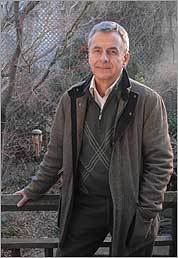Free Play
 I enjoyed Jenna Russell's interview in the 20 Jan 2008 Boston Globe's Ideas section with Roger Hart, CUNY professor of environmental psychology. It's headlined, "Sheltered lives: When did kids stop playing outside?"
I enjoyed Jenna Russell's interview in the 20 Jan 2008 Boston Globe's Ideas section with Roger Hart, CUNY professor of environmental psychology. It's headlined, "Sheltered lives: When did kids stop playing outside?"
As a graduate student in 1972, Hart visited a Vermont town to study how children played. That led to a series of short documentaries with filmmaker John Marshall. (Flickr set of images from those movies here. For Americans of my age, I suspect there's a definite Zoom vibe to the whole project.)
The Globe interview included this interesting exchange:HART: Back then, there wasn't this tight intermeshing between parents' and children's lives. On weekends, especially Sundays, there would be greater locking in, but the rest of the time, children came home from school and went straight out.
The American Psychological Association website offers another article on Hart's work from 2006.
IDEAS: And now?
HART: There was a question the children would jump to, this time, when I asked it, which was, "Tell me the times when you're just with other children, without adults organizing you." No one has ever asked them that before, but they immediately know the answer, and it's important to them. They'll say things like, "Oh, before football practice, when we're just hanging around, before we start, and then when we're on the school bus." So they know these settings where there's a chance for them to invent their activities with one another, and it's very rare.
IDEAS: How did they get so busy?
HART: There has been too much hype from psychologists in the last decade about how crucial it is to push children when they're young, and not many saying what they should be saying, which is that there are also benefits to children having free play.
IDEAS: Are the changes affecting the skills children develop?
HART: A sizable number of my parents say they're concerned their children are not as imaginative as they were, not as able to invent activities without the script being given to them. Parents say their kids often say to them, "What do I do now?" If the parents ask them to go outside and play, the kids say, "Come and play with me."
IDEAS: Are there any positive changes?
HART: There are. Almost all the parents feel closer to their children than their parents were to them. That's fascinating -- it's the flip side of children having less freedom.


No comments:
Post a Comment